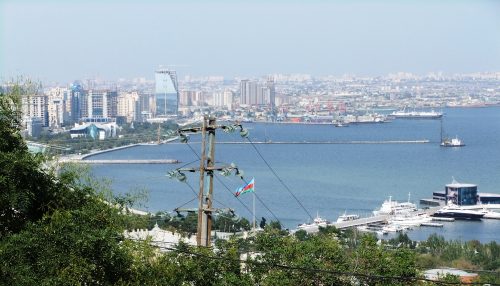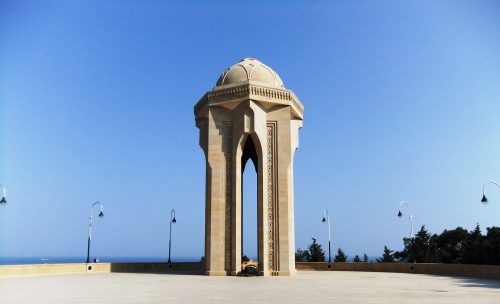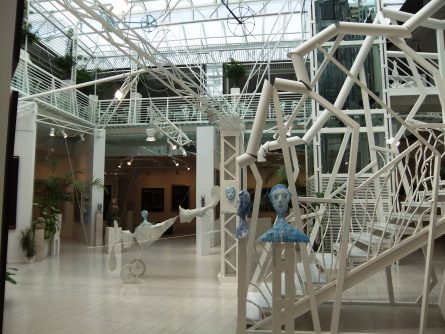Baku, Azerbaijan is a very pleasant city. But still quirky!
Baku, the capital of Azerbaijan, is really rather strange;
a very pleasant place, to be sure, but distinctly odd.

It is a city of great contrast. Battered old Ladas jostling in traffic alongside shiny new BMWs; gorgeous, statuesque buildings stand next to blocks of rotting Soviet-era concrete; wide and perfectly constructed eight-lane highways intersect with rutted and gravelly streets; exquisitely laid out parks and central areas co-exist with dusty neighbourhoods strewn with garbage.
I had been here a few months ago, but only for a couple of days, and now wanted to see more of Azerbaijan, but first its capital city.
Above all, it is a city of construction. I have never seen so many buildings growing from the dust; museums, hotels, offices and apartments all shooting up at speeds that make you giddy!

It is not that Baku is alone with these contrasts, it is just that there has been so much rapid development, fuelled in the past ten to fifteen years by a massive influx of oil and gas money, that the pace of development is tripping over itself in its haste to erase the past.
I am, I have to add, fascinated by the ghastly destruction that the Soviets left behind. The acres and acres of dead factories that frankly never really worked at all; rusting piles, rotting pipelines, grim and filthy oil installations, crumbling apartment blocks and squadrons of brutally solid trucks and buses belching their way around.

All mixed together with a permeating sense of industrial gloom that is difficult to explain.
From Estonia, not the Tallinn of tourists that has been brightly polished, but the small rural towns with their long-dead industries, to the Ukraine and of course the Caucuses, I have been mesmerised by the detritus of a failed economic system, and watching the old being swept away and their replacements splutter into action.
But it is in Baku that I now sit, and it is Azerbaijan that has the money and will power to eliminate the old, replace with new and move forward as fast as possible.
This is the surprise of the place.
Baku is not what one would call lovely. For sure, there are many delightful places, including the UNESCO recognised Old City, where I am now sitting. Adjacent to the Old City lies Fountain Square, a gorgeous pedestrian precinct of manicured gardens, fountains and wide boulevards; a five square kilometre part of the sea shore has been designated a national park, and offers a delightfully shady place to wander by day or night.
There are wide leafy boulevards that would make the original oil barons envious, lined by shops of the world’s great designer brands.

There are magnificent government buildings, art galleries, museums and the restored mansions of the late 19th century oil barons are gorgeous. But there is something missing.
Baku was not the traditional capital of Azerbaijan, that was the town of Samaxi, some 100 kilometres inland and virtually destroyed by an earthquake in 1191. The complex politics of the Caucuses as countries, khanates and caliphates struggled for power continued for centuries with the major seat of power evolving in Ganca in the west of the country.
However, by the mid-seventeenth century, Baku’s prominence was growing, despite its dry, dusty location, and brutal weather. Oil was known to be in the vicinity and finally by the late 1800s the oil industry was opened up, and money flooded in.
The city grew from a population of about 10,000 to 1,000,000 in a few short decades, and exploded beyond the walled city and its graceful surrounds to overcome the surrounding hills.
Its development is, of course, in almost complete contrast to the countryside, but that is the way of the world. It will spread, but for now we watch Baku’s growth with a mixture of awe and bewilderment. As a city, it is a fascinating and important destination; easy to get to, simple to get around and an abundance of great sights to see and fine food to eat!
And tonight, it is off on the overnight train to Georgia. Tbilisi to be accurate, and a completely different country in the mosaic that comprise the Caucuses.

August 27, 2010 @ 3:10 pm
Hello Max,
Have you, actually, been to Baku and/or Azerbaijan when it was in Soviet Union? Have you been to any other soviet republics when, yes, they were Soviet. Will be very thankful if you give a reply.
Thanks
August 28, 2010 @ 6:07 pm
Hi "V": no, I was not in the Caucuses during the Soviet era, and only had travel experience in the formere Eastern European satellites.
I was able to spend time in Poland, East Germany, Hungary, Czechoslovakia and Romania in the 1970s and early 80s, and also drove through Yugoslavia and Bulgaria several times.